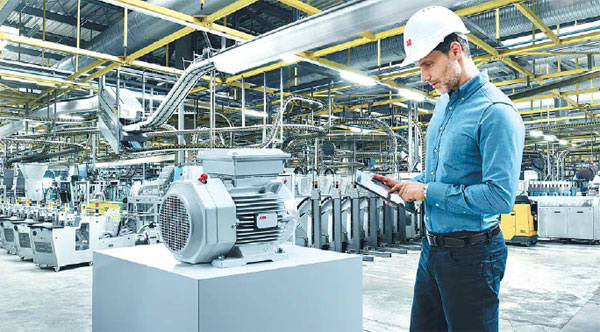Digital technologies bring faster ways to upgrade industries
In its quest to become a stronger manufacturer, China is on track to boost its global competitiveness through Made in China 2025, an initiative to accelerate energy efficiency and productivity, and to support investment in advanced technologies.
Today, China has 49 robots per 10,000 workers in industry, compared with 176 in the United States, around 300 in Japan and Germany, and 531 in South Korea, according to the International Federation of Robotics.
The country's productivity is less than a tenth of the levels in Europe, Japan and the US, according to the International Labor Organization and the National Bureau of Statistics of China.
That said, few countries are better positioned than China to embrace the digital revolution.
The country already has almost a quarter of the world's internet users, more than the next three largest countries combined: the US, India and Japan. It is the world's largest digital retail market and has by far the most machine-to-machine mobile connections.

The challenge is to integrate Chinese enterprises into the digital economy by connecting their robots, machines and plants to the industrial internet. One advantage of digitalization is that enterprises can reap benefits quickly without needing to make substantial investments in new plants and equipment.
For instance, an easily affordable smart sensor device ABB Group launched last year connects low-voltage electric motors to the industrial internet, allowing them to be continuously monitored.
The sensor transmits data on vibration, temperature, loads and power consumption to the intelligent cloud and alerts are generated as soon as any of the parameters deviate from the norm.
That way, the owner can take preventive action before a motor malfunctions.
Cybersecurity is assured because there is no electrical connection between the sensor and motor, so no unauthorized party can gain control of the motor through the unit.
Data is transferred to servers using industry standard encryption protocols and is stored in an encrypted form in the cloud.
Early indications show that this smart sensor solution leads to a reduction in motors' downtime by up to 70 percent and an extension of their lifespan by up to 30 percent.
Acting on the data in order to optimize the motor's performance can reduce energy consumption by as much as 10 percent.
If all of the 300 million industrial electric motors worldwide were equipped with these devices, the energy savings would be equivalent to the output of 100 large power plants.
Digital technologies, such as sensors, cloud computing and processing power, have made it possible to remotely monitor all manner of equipment, allowing technicians to pre-empt malfunctions and to track every product throughout any production and delivery processes. Applied across industrial plants, the improvements in lead time, productivity and quality can be exponential.
However, for many enterprises, the challenge is knowing what to do with all the data generated by their equipment and systems.
In some cases, the data deluge - as it is known - has overwhelmed many companies, leading them to scale back or even put on hold plans to digitalize their operations.
Industrial companies can avoid this pitfall by working with partners that not only provide data, but also actionable information that the company can apply directly to their operations.
ABB is one of a small number of companies that is able to provide such information because, as well as having digital know-how, we have one of the largest installed bases - including power grids, industrial robotics and control systems - in the industry.
We analyze data from our customers' machines, robots and facilities, compare this with everything we have learned from our global installed base and then provide our customers with actionable information with which they can optimize their operations.
Because no single solution can keep increasingly interconnected systems secure indefinitely, we use multiple security layers to detect and deter threats, in close collaboration with customers.
In China, digital technologies have enormous potential in the areas of energy, industry, transport and infrastructure.
To achieve its energy transition, the country needs high-voltage transmission infrastructure supported by intelligent grids to manage power flows from intermittent renewable energy sources and to route power to where it is needed.
China needs to improve its industries' uptime, speed and yield as well as upgrade its industrial base through automation.
To tackle urban air pollution and manage its expanding mega-cities, China should look to transition rapidly to electric mobility and improve the energy efficiency and performance of its buildings and infrastructure.
Digital technologies offer a fast and effective way to address these challenges, and can lead the upward shift of the industrial value chain.
There is strong evidence to suggest that digital technologies spur innovation by placing advanced technologies within reach of entrepreneurs.
This is evident with the staggering success of online retailer Alibaba Group, taxi-hailing app Didi Chuxing and Tencent Holdings' messaging and electronic payments platform, WeChat.
The more China can embrace digital technologies in industry, the more it can expect to see pioneering technology solutions emerging in the industrial world.
The writer is the president and CEO of ABB.
|
A technician checks a smart sensor developed by ABB. Photos Provided To China Daily |
(China Daily 03/18/2017 page6)















